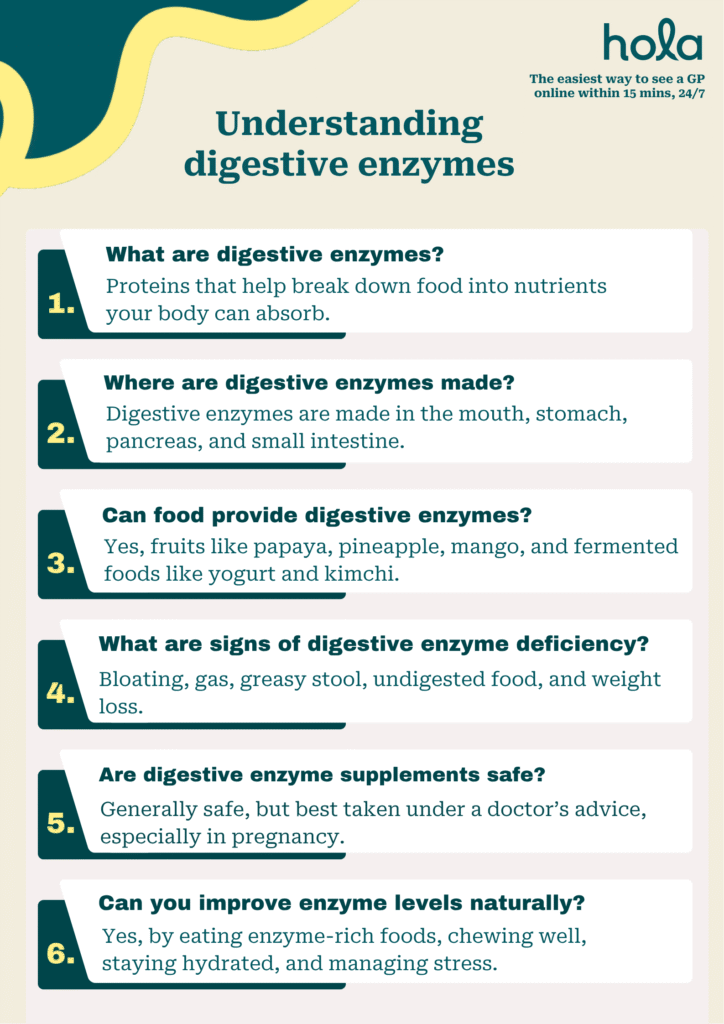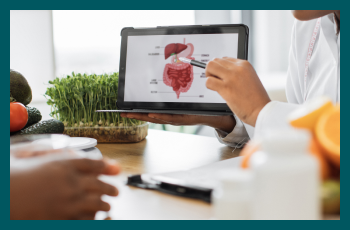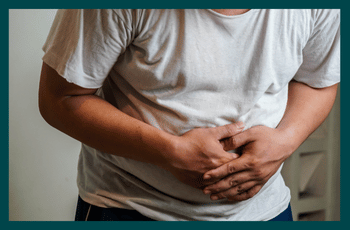Understanding digestive enzymes and their role
Written by the editorial staff writer at Hola. Medically Reviewed by Dr Nelson Lau, MBBS FRACGP, GP & Digital Health Specialist.

Contents

Summary: Digestive enzymes are specialised proteins that help break down food into nutrients the body can absorb. The mouth, stomach, pancreas, and small intestine produce them. Each enzyme targets a particular type of nutrient: amylase breaks down carbohydrates, protease works on proteins, and lipase helps digest fats. Without these essential enzymes, digestion would be incomplete, leading to problems like gas, bloating, or nutrient deficiencies. Our expert GP Dr Lau added that there are also other brush-border enzymes such as lactase, maltase and sucrase produced in the small-intestinal lining. Understanding their role emphasises the value of a healthy digestive system and the crucial role of enzyme activity.
Have you ever wondered what happens to your food after you swallow it? Inside your body, tiny workers called digestive enzymes get to work! They break down your food into simpler substances so your body can absorb essential elements, such as energy, nutrients, and vitamins. Without these enzymes, your snacks and treats wouldn't be much help!
Overview of digestion and why enzymes matter
Digestion is the process by which the body breaks down food into simpler substances so that nutrients can be absorbed for energy, development, and restoration. It starts in the mouth and proceeds through the stomach and intestines.
Digestive enzymes are essential because they accelerate the breakdown of carbohydrates, fats, and proteins into their fundamental components, such as sugars, amino acids, and fatty acids. Without these enzymes, digestion would not be possible, leading to poor nutrient absorption and gastrointestinal issues. Ultimately, enzymes are essential for effective digestion and keeping the body nourished and healthy.
What are digestive enzymes?
Digestive enzymes are specialised protein molecules that help in breaking down the food we consume into smaller, nutrient-sized particles that the body can absorb. These enzymes serve as natural catalysts, enhancing the speed of digestive reactions without being consumed in the process. They are catalysts that take part in reactions and are regenerated, so that they can act repeatedly throughout the digestive tract, according to Dr Lau.
These enzymes are secreted by different parts of the digestive system, such as the salivary glands, pancreas, stomach, and small intestine, and each enzyme targets a specific type of nutrient:- Amylase helps break down carbohydrates into simple sugars.
- Lipase breaks down fats into fatty acids and glycerol.
- Protease (such as pepsin and trypsin) breaks down proteins into amino acids.
Also read: How to improve gut health: Doctor-approved guide
Feeling sick and unsure why? Speak with a GP online in 15 minutes.
Natural vs supplemental enzymes
- Natural enzymes: Natural enzymes are generated by the body or can be found in uncooked foods such as fruits, vegetables, and fermented items. They assist in breaking down food and facilitating digestion. For instance, papaya has papain, while pineapple contains bromelain, both of which are natural enzymes that aid in protein digestion. Raw fruits contain active enzymes, but most are inactivated in the stomach and their direct impact on human digestion is limited.
- Supplemental enzymes: Supplemental enzymes are artificially created or extracted from natural sources and are available in pill or powder form. They are used when the body does not produce enough enzymes due to conditions like pancreatic insufficiency, lactose intolerance. Supplements typically include protease, lipase, amylase, and lactase.
Types of digestive enzymes and their functions
Here is a list of common digestive enzymes along with their specific roles:- Amylase – Transforms carbohydrates into simple sugars. It is found in saliva and the pancreas.
- Protease – Aids in breaking down proteins into amino acids. The stomach, pancreas, and small intestine produce it.
- Lipase – Converts fats into fatty acids and glycerol. The pancreas and lingual glands secrete it.
- Lactase – Specifically breaks down lactose (milk sugar). It is produced in the small intestine.
- Maltase – Changes maltose (a sugar from starch) into glucose. It is found in the small intestine.
- Sucrase – Disintegrates sucrose (table sugar) into glucose and fructose. It is also generated in the small intestine.
Why digestive enzymes matter
Digestive enzymes are crucial for converting the food we consume into nutrients that the body can take in and utilise. Without them, proteins, fats, and carbohydrates remain too complex for proper processing by the body. This can lead to bloating, indigestion, nutrient deficiencies, and gut discomfort.
Enzymes aid in smoother digestion, enhance nutrient absorption, and contribute to maintaining a balanced gut health. They are particularly important for individuals with enzyme deficiencies or digestive disorders. Supporting enzyme function, whether naturally or through supplements, can greatly improve overall digestive health. However, in people without an enzyme deficiency, supplementation has not been shown to improve nutrient absorption.
Also read: IBS, IBD, GORD – What’s the difference?
Signs you may have a digestive enzyme deficiency
If your body is not generating enough digestive enzymes, you might experience symptoms such as bloating, gas, and stomach cramps post-meal. Other indicators include undigested food in stool, frequent diarrhoea or constipation, and a sense of fullness after eating small portions. You may also observe greasy or foul-smelling stools due to inadequate fat absorption.
Unexplained weight loss, fatigue, or symptoms of nutrient deficiencies (such as brittle nails or hair loss) may also indicate enzyme problems. If these signs continue, it’s essential to seek advice from a doctor or a GI specialist for proper evaluation and care.
Causes of enzyme deficiency
A deficiency in digestive enzymes can arise from various factors:- One frequent reason is pancreatic disorders, like chronic pancreatitis or cystic fibrosis, which reduce enzyme output.
- Lactose intolerance is another example, caused by insufficient lactase levels in the small intestine.
- Aging can gradually lower enzyme production over time.
- Certain gastrointestinal conditions, like celiac disease, Crohn’s disease, can harm the lining of the digestive tract, affecting enzyme release.
- A poor diet, chronic stress, or prolonged use of medications (such as antacids or antibiotics) can also disrupt enzyme function. Some medications, eg. Very high-dose PPIs may alter gastric pH and secondarily affect enzyme activity, though data is limited.
- In rare instances, enzyme deficiencies might be genetic, meaning the individual is born incapable of producing specific enzymes.
How to support healthy enzyme levels naturally
To maintain healthy enzyme levels:- Concentrate on a diet abundant in enzyme-enhancing foods. Uncooked fruits and vegetables such as papaya, pineapple, mango, avocado, and sprouts naturally contain enzymes that support digestion. Fermented products such as yogurt, kefir, sauerkraut, and kimchi also support gut health and boost enzyme production.
- Chew your food well. Thorough chewing and adequate hydrationioptimise the contact between food and enzymes already present. Managing stress is also vital, as ongoing stress can disrupt digestive functions. Avoid overeating, limit processed foods, and keep consistent mealtimes to help your body regulate enzyme production.

When to see an online doctor
You should seek the advice of an online doctor if you're experiencing persistent digestive issues, such as frequent bloating, gas, or lasting changes in your bowel habits. It's also crucial to reach out if you have a digestive enzyme deficiency, particularly if you're facing symptoms like undigested food in your stool, fatigue, or unexpected weight loss.
A telehealth GP can evaluate your symptoms, recommend changes to your diet, suggest necessary tests, provide medical certificates online and prescribe medications like enzyme supplements if required. This is a fast and convenient way to receive expert assistance without having to visit a health clinic. Some prescription-only pancreatic enzyme supplements (eg. High-strength pancrelipase) may require a face-to-face consult under PBS rules.
Conclusion:
Digestive enzymes are essential for breaking down food and keeping you healthy. When you take care of your gut, these enzymes work better, and you feel your best!FAQs
What are digestive enzymes?
Digestive enzymes are proteins that help break down food into simpler nutrients, so the body can absorb them. They are produced in the mouth, pancreas, stomach, and small intestine. Key types include:- Amylase - breaks down carbohydrates
- Lipase - breaks down fats
- Protease - breaks down proteins
How to improve digestive enzymes naturally?
Digestive enzymes can improve naturally through the following methods:- Eat enzyme-rich foods like raw fruits and vegetables
- Eat fermented foods like yogurt, miso, or kimchi to support gut health and enzyme activity
- Add herbs and spices to your meals to boost digestive activity (some spices eg. Ginger, may modestly stimulate gastric motility, but firm human data is limited.
- Chew food thoroughly to stimulate saliva production
- Stay hydrated, as water is essential for enzyme function and overall digestion
- Avoid overeating
- Manage stress
Is it safe to take digestive enzymes when pregnant?
Digestive enzymes are usually safe during pregnancy, but it’s essential to seek medical advice beforehand. Enzymes naturally present in foods are generally fine, but concentrated supplements might pose risks. Safety depends on the type, dosage, and your health condition. Always consult your healthcare provider before using them.Should I take digestive enzymes with every meal?
It’s not necessary to take digestive enzymes with every meal unless a doctor recommends it. They can be beneficial for those with digestive problems, but if you’re healthy, your body produces enough naturally. There is no evidence that routine therapeutic doses down-regulate your own enzyme output.Are digestive enzymes good?
Yes, digestive enzymes can be beneficial if used appropriately. They help the body break down and absorb essential nutrients. These enzymes can be especially helpful for people with digestive problems like gas, bloating, or enzyme deficiencies. However, healthy people don’t require additional enzyme supplements unless advised by a doctor.How do I know if I have a digestive enzyme deficiency?
You may have a digestive enzyme deficiency if you experience symptoms like:- Gas
- Bloating
- Stomach pain after eating
- Diarrhoea or constipation
- Greasy or foul-smelling stool
- Undigested food in the stool
- Unexplained weight loss
Can I get digestive enzymes through food?
Yes, you can get digestive enzymes naturally from some foods, including:- Fermented foods like yogurt, kimchi, or kefir
- Mango
- Pineapple (contains bromelain)
- Papaya (contains papain)
- Avocado
- Kiwi
Do I need a prescription for digestive enzymes?
In Australia, many digestive enzyme supplements can be purchased without a prescription for general digestive support. However, medically necessary enzymes are required for specific conditions like pancreatic insufficiency, and these must be prescribed by a doctor. It’s best to check with a healthcare provider before starting any supplement regimen.Feeling sick and unsure why? Speak with a GP online in 15 minutes.
What we treat
- Cough
- Nausea & vomiting
- Fever
- Hayfever
- Fatigue
- Sore throat
- Acne
- Hair loss
- Gout
- Eczema
- Rosacea
- Sunburn
- UTI
- Erectile dysfunction
- Contraception
- Morning sickness
- Morning after pill
- Prostate health
- Anxiety
- Depression
- Stress
- Grief & loss
- Antidepressants
- Premature ejaculation
- Asthma
- Blood pressure
- Blood thinners
- Diabetes
- Cholesterol
- Migraines & headaches
- Allergies
- Body ache
- Heartburn & reflux
- Sleep disorder
- Pain relief
- Gastro
Related Articles
Disclaimer
This blog is for general informational purposes only and does not indicate that Hola Health provides all treatments or preventive measures mentioned. It is not intended to be a substitute for professional medical advice. Always seek the guidance of your doctor or other qualified health professional with any questions you may have regarding your health or a medical condition. For emergencies please immediately contact 000. Any medical topics discussed are intended to educate, not to imply availability through Hola Health.

Get affordable healthcare on your terms, with quick access to qualified, Australian-registered telehealth doctors & health practitioners, 24/7, 365 days a year. No more searching for ‘doctors near me‘ – Hola connects you instantly.
Address: 79 St Georges Terrace, Perth WA 6000


Hola Health App
Get affordable healthcare on your terms, with quick access to qualified, Australian-registered telehealth doctors & health practitioners, 24/7, 365 days a year. No more searching for ‘doctors near me‘ – Hola connects you instantly.
Call 000 for emergency or urgent medical help.
Address: 79 St Georges Terrace, Perth WA 6000
© Hola Health, a brand of Packapill Pvt Ltd


 Facebook
Facebook  X
X  Copy Link
Copy Link











